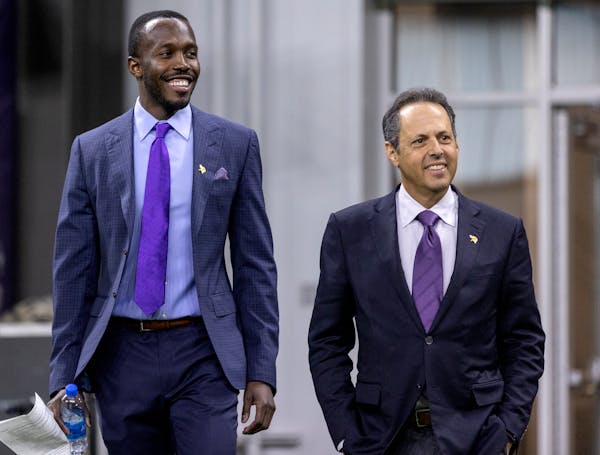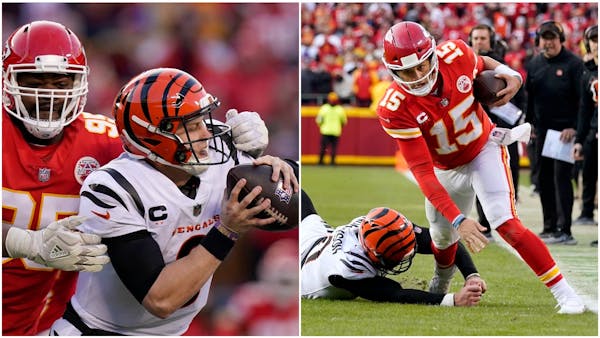In a news conference Thursday, new Vikings General Manager Kwesi Adofo-Mensah told a story from his introductions to the rest of the 49ers front office after John Lynch became GM and Kyle Shanahan became coach in 2018.
"We had a meeting where everybody goes around the room and introduces themselves, and I took that opportunity to stand up and say, 'I don't know what analytics is.' I think I might've laid an expletive in there so I could be extra 'football guy,' " Adofo-Mensah said with a smile. "For me, it's about being thoughtful and intentional. And I don't think that's a new thing; I think that word's become really about who's doing the work, not what is being done."
But he tried to define the "what" anyway for the reporters in the room and the fans watching.
"It's about asking why, trying to figure out what you're doing, and sometimes that involves quantitative research, sometimes that involves just talking to people about experience, using their intuition," he said. "It varies, but at the end of the day, the core thing is learning, trying to figure out why, and then using that 'why' to make better decisions with intent and just a detailed focus. So that's really what it means to me. I can't speak for other people when they use that word."
What the word "analytics" means to other people — both in the Vikings organization and in the community that follows it closely — will determine much of the initial perception of Adofo-Mensah's work, particularly before the Vikings' new regime has any wins or losses to its credit.
The term is used often enough in sports (quite often by journalists and pundits without formal education in data analysis) to lose much of its meaning, and the exchange Adofo-Mensah recalled Thursday seemed as much about winning over skeptics now as it was then.
So as the Vikings GM, who has economics degrees from Princeton and Stanford, gets started in his new role, it's worth spending a few minutes on what his approach to the job could mean and what it likely will not.
Circling back on details
Like Adofo-Mensah, Vikings Chief Operating Officer Andrew Miller spent time in two data-driven environments (Silicon Valley and Wall Street) before coming to professional sports. Their backgrounds, both men say, help them appreciate that data can point toward important conclusions that the human brain, with all its preconceived biases and limitations, can miss.
"Humans are really great at that higher-order, complex thinking," Adofo-Mensah said. "And so, a lot of times, that gift becomes a curse, in a sense, because you sometimes will miss the simple thing. So analytics, or simple observations, allows you to write those simple observations down as data and be able to go back later and study them historically. Very simply, you can go back and say, 'Hey, is there any information that would've helped us make this decision better in the past?' "
Data revolutionized Major League Baseball, where Miller was a top executive for the Cleveland Guardians and Toronto Blue Jays, by helping low-revenue teams find valuable players. It led NBA teams to emphasize more efficient shots such as the corner three-pointer, and has begun to overturn traditional thinking about how NFL teams should approach fourth downs.
The league's investments in player tracking, via RFID chips in shoulder pads, deliver real-time metrics that quantify a ballcarrier's speed, quarterbacks' effectiveness at fitting the ball into tight windows and a receiver's ability to separate from coverage. A team that included three St. Olaf graduates won the NFL's Big Data Bowl competition last year by using player tracking data to identify defensive coverages and assess which players executed them most effectively.
Those tools, and other sources of data to quantify and contextualize performance, can help teams become more effective at identifying which players to keep, which opponents to attack and which schemes to emphasize, especially when married with a scout's eye for talent and a coach's ability to develop young players.
They can also be used to keep players healthier: former Vikings coach Mike Zimmer altered some of his practice schedules late last season after strength and conditioning coach Josh Hingst and head athletic trainer Eric Sugarman presented him with tracking data to show which players needed a break after a strenuous workload.
"It's hard for me, anyway, but we do have some older players that we have to take care of," Zimmer said in December. "There's a fine line with some of the young guys that ... don't get as good [of] work as they would, but I think it's important that we continue to try to stay fresh."
Draft value judgments
Under Rick Spielman, the Vikings analytics department did some of its most meaningful work before the draft, where the former GM's habit of trading down to accumulate more picks (even if it annoyed fans and coaches at times) was often supported by data, at least in the early rounds.
Adofo-Mensah's front office could expand on that work, building models to properly value draft picks and the places where it makes sense to trade up. Considering how often teams across the league miss on picks, mining extra information in the name of a more efficient draft can't hurt.
Both Adofo-Mensah and his former boss, Browns GM Andrew Berry, were careful to emphasize last week the work the new Vikings GM has done to develop as a scout. The Vikings figure to keep many of their scouts — including co-directors of player personnel Ryan Monnens and Jamaal Stephenson, who were both involved in picking Adofo-Mensah — so the idea that the entire football department is about to be overrun by nerds (or whatever pejorative you favor) seems off-base.
"I think part of it maybe is the baseline assumption you have to silo your groups. We don't really believe in doing that," said Berry, who has economics and computer science degrees from Harvard and started his NFL career as a scout. "The job, if you're a department head or a general manager, it's so broad across football operations, you really should have working knowledge of all areas. The way I like to say it is, anyone who comes in our organization, they have a major and then maybe seven or eight minors."
Adofo-Mensah will have to sell his approach, both within the organization and to the fanbase, and as he talked about "finding a partner for me" in the Vikings' coaching search, it's unlikely the next head coach will be ambivalent about the idea of using data as a tool.
But while change can be scary, as Miller said in a November 2020 interview, a pivot toward the type of data-driven efficiencies seen across the business world and in many other sports doesn't have to be a bad thing. If it works for the Vikings, it could inspire plenty of imitators.
"The truth is, our world is always changing," Miller said. "Starting [my career] out in the world of technology, it's just rapid. There's an expectation that, every 18 months, the technology has evolved — and frankly, that's been 25 years, so it's probably down to like six months or something. You're always thinking about how to improve something, how to build something better."

Timberwolves push back in OT, top Kings despite Fox's 60 points

Falvey's baseball-and-biz assignment is rare, but he's seen it done

For the Wild, the Central is central indeed


